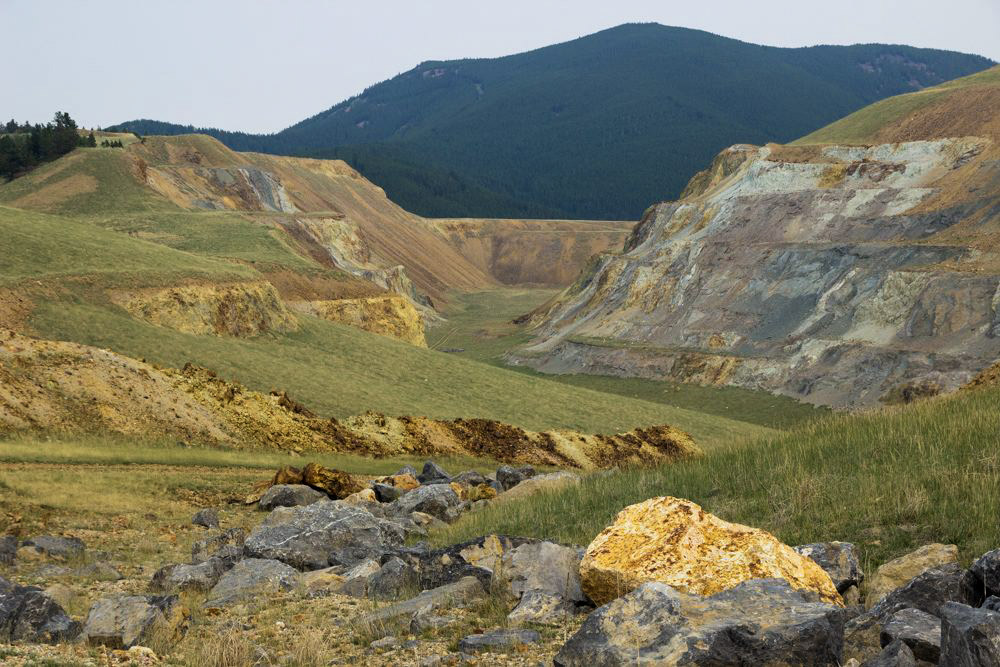Indianz.Com > News > Montana Free Press: Tribes and tribal elders sue to stop mining

Tribes and environmental groups revive effort to block Hecla mines
In a new lawsuit, the groups say the state Department of Environmental Quality’s decision to drop ‘bad actor’ claims against Hecla CEO Philip Baker Jr. is an ‘abrupt and unjustified agency reversal.’
Friday, November 19, 2021
Montana Free Press
The Fort Belknap Indian Community, Confederated Salish and Kootenai Tribes, Ksanka Elders Advisory Committee and a coalition of environmental groups have revived a legal effort to prevent Hecla Mining Company from operating two silver and copper mines in northwestern Montana.
Yesterday’s lawsuit represents the latest turn in a multiyear saga involving the Zortman-Landusky mine, which produced 2.5 million ounces of gold from the Little Rocky Mountains of north-central Montana before Pegasus Gold Inc. filed for bankruptcy in 1998, and Hecla’s Rock Creek and Montanore mines, which are believed to hold huge deposits of silver and copper.
In 2018, under Gov. Steve Bullock, the Montana Department of Environmental Quality sought to block Hecla from moving forward with the Rock Creek and Montanore mines until the company reimbursed the state for millions of dollars it’s spent cleaning up acid mine drainage and cyanide pollution stemming from the Zortman and Landusky mines. That pollution has compromised the Fort Belknap Indian Community’s water supply, and mitigation of the contamination is expected to continue for generations.
At issue is a provision of the Metal Mine Reclamation Act that bars an executive of a mining company that has reneged on its cleanup duties from undertaking new mining operations in the state without first repaying reclamation bills and restoring former mining sites. Hecla disputed DEQ’s decision to label Hecla’s CEO a “bad actor” for his connections to Pegasus and the failed Zortman-Landusky cleanup and sued the department.
Billings native Amanda Eggert covers environmental issues for Montana Free Press. Amanda is a graduate of the University of Montana School of Journalism who has written for Outside magazine and Outlaw Partners. At Outlaw Partners she led coverage for the biweekly newspaper Explore Big Sky. Contact Amanda at aeggert@montanafreepress.org.
Note: This story originally appeared on Montana Free Press. It is published under a Creative Commons license.
Search
Filed Under
Tags
More Headlines
Native America Calling: Assessing current health threats to Indian Country
‘I am finally going home’: Leonard Peltier released from prison after nearly five decades
NAFOA: 5 Things You Need to Know this Week (February 18, 2025)
Chuck Hoskin: Cherokee Nation supports our artists
Native America Calling: Native activism marks victory with Leonard Peltier’s release
Native America Calling: What Indigenous people in Greenland really want
Native America Calling: Traditional love stories
RECAP: National Congress of American Indians continues big meeting in DC
Native America Calling: Honoring artists who demonstrate community spirit
RECAP: National Congress of American Indians opens big meeting in DC
‘We stand firm. We hold our ground’: Federal freeze impacts tribal gathering in nation’s capital
AUDIO: The 2025 State of Indian Nations in Washington, D.C.
RECAP: National Congress of American Indians hosts State of Indian Nations
Chuck Hoskin: Cherokee Nation empowers new generation of agriculture stewards
Native America Calling: The State of Indian Nations in 2025
More Headlines
‘I am finally going home’: Leonard Peltier released from prison after nearly five decades
NAFOA: 5 Things You Need to Know this Week (February 18, 2025)
Chuck Hoskin: Cherokee Nation supports our artists
Native America Calling: Native activism marks victory with Leonard Peltier’s release
Native America Calling: What Indigenous people in Greenland really want
Native America Calling: Traditional love stories
RECAP: National Congress of American Indians continues big meeting in DC
Native America Calling: Honoring artists who demonstrate community spirit
RECAP: National Congress of American Indians opens big meeting in DC
‘We stand firm. We hold our ground’: Federal freeze impacts tribal gathering in nation’s capital
AUDIO: The 2025 State of Indian Nations in Washington, D.C.
RECAP: National Congress of American Indians hosts State of Indian Nations
Chuck Hoskin: Cherokee Nation empowers new generation of agriculture stewards
Native America Calling: The State of Indian Nations in 2025
More Headlines

